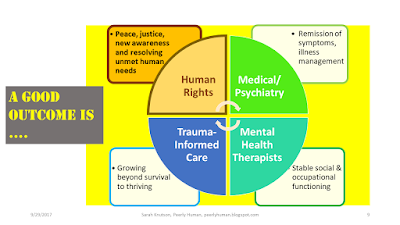1. Disease model psychiatry
Medical model psychiatry tends to sees 'abnormal' human thoughts and behaviors as originating from genetic, biochemical or biological diseases of the brain.2. Conventional 'talk' therapy
Conventional talk therapy includes psychodynamic, cognitive-behavioral, solution-focused and humanistic-existential. These groups often see human thoughts and behaviors as disordered, but they tend to stress see the origins of 'dysfunction' as originating in thinking processes, relationships and learned behaviors.3. Trauma- Informed Care
Trauma-informed care often does not see people as disordered. This kind of care tends to see extreme states and actions as arising from extreme circumstances (traumatic) in real life. It tends to ask "What happened to you?" instead of "What's wrong with you?"
4. Human Rights
Human rights sees challenge as inherent in the nature of life. It sees conflict as arising from insecurity over basic needs that we all share. It rejects the idea that some of us are 'expert' and some of us are not on the things that are most important in life. From a human rights perspective, we are all 'peers' on this human journey. We all have something to contribute and something to learn, as well as gifts to share and things we need to access in order to share them.
That's all for hour #5.
The next how we will say more about the next slide below:








No comments:
Post a Comment
Please share your thoughts: